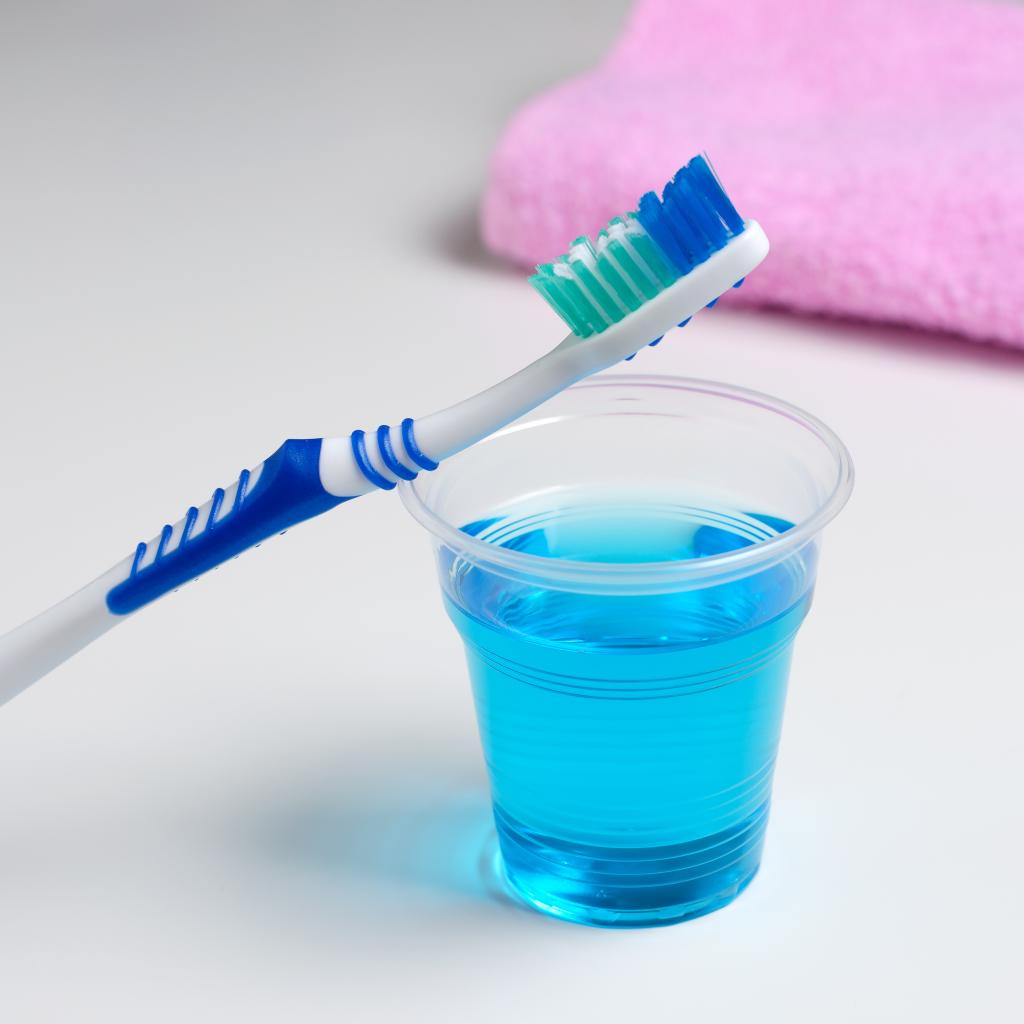
Everyone knows that brushing and flossing teeth is essential for oral health. But what about using mouthwash? Whether you have or have not used mouthwash, here is some information to help you learn and decide what is best for you.
There are many different types of mouthwash available over-the-counter or by prescription. Some mouthwashes freshen breath, while others fight cavities and prevent gum disease; you should be able to find a mouthwash that combines all three benefits.
Here is a brief overview of the types of mouthwashes:
- Alcohol-based vs. Alcohol-free – Alcohol helps kill germs, but the strong burning feeling causes many people to spit it out before the germ-killing properties do their job. Alcohol-free mouth rinse is easier to use because it is not as strong. It is more comfortable for those struggling with tooth or gum sensitivity.
- Fluoride Mouthwash vs. Non-fluoride – Fluoride is recommended by the American Dental Association (ADA) to strengthen teeth and prevent cavities, so may want to enhance your oral care regimen with a mouthwash containing fluoride. Non-fluoride oral rinses are also available.
- Prescription – If you are struggling with mouth sores or gingivitis, there is good news! Your dentist can prescribe an antibiotic mouthwash that will help decrease inflammation and promote healing in your mouth.
5 Benefits of Mouthwash
Mouthwash can be a good addition to your oral healthcare routine. Consider these five benefits of using mouthwash.
Benefit #1: Mouthwash temporarily erases bad breath.
Nobody wants embarrassing encounters at home or work. Extend fresh breath by swishing mouthwash inside your mouth after brushing your teeth. Gargling the oral rinse would be even better because it would help clear your throat of any loose food particles and germs.
Benefit #2: Mouthwash makes your mouth feel fresh and pleasantly minty.
The incredible minty feeling and smell that follows using mouthwash can be just the ticket for increasing your alertness, confidence, and productivity. You can dilute your oral rinse with water if it is too strong for you. It is a quick way to get that refreshing minty feeling throughout the day, between brushing and flossing.
Benefit #3: Mouthwash promotes oral health and relieves mouth conditions.
Some oral rinses contain germ-fighting ingredients that can help keep your teeth and gums healthier. “Mouthwashes may offer additional benefit in terms of reducing the risk of bad breath, cavities, or gum disease; or for relief of dry mouth or pain from oral sores.” (ADA). Your dentist can prescribe an oral antibiotic mouth rinse after determining your oral health. Make sure to follow label directions and keep it away from children.
Benefit #4: Mouthwash is simple to use when away from home.
When brushing your teeth is not possible, such as after lunch or while traveling, you could quickly use an oral rinse to freshen your breath. A travel-size mouth rinse easily fits in a pocket, small bag, or briefcase. To avoid spilling, we recommend storing it in a liquid-tight plastic bag just in case the lid comes loose.
Benefit #5: Mouthwash is an affordable self-care item.
If you do not want to spend your money on a mouth rinse, or if you forgot to add a mouth rinse to your shopping list, you can use something you probably already have on hand instead:
- Salt-Water Rinse: Add some salt to warm water and gargle for a few seconds for fresher breath.
- Water: In a pinch, stop by a water fountain and swish some water in your mouth. This can get rid of food particles and leave you with slightly fresher breath. Rinsing with water is also a good practice after you eat or drink acidic or sugary foods and beverages.
Warnings:
- According to the ADA, children under six years of age “should not use a mouthwash, unless directed by a dentist, because they may swallow large amounts of the liquid inadvertently.” Most oral rinse bottles have a lid that would be difficult for a child to open. To be safe, mouthwash should be kept out of the reach of children.
- Always read the ingredients and warnings on oral rinses, as there may be interactions with the other oral health products you’re using.
We hope this information has given you a fresh perspective on oral rinses. Check with your dentist to see if an oral rinse is a good choice for you.
Learn about what types of foods fight bad breath and promote oral health by reading this article. And, if you have questions or would like to set up an appointment, contact our office today.
